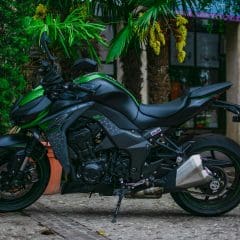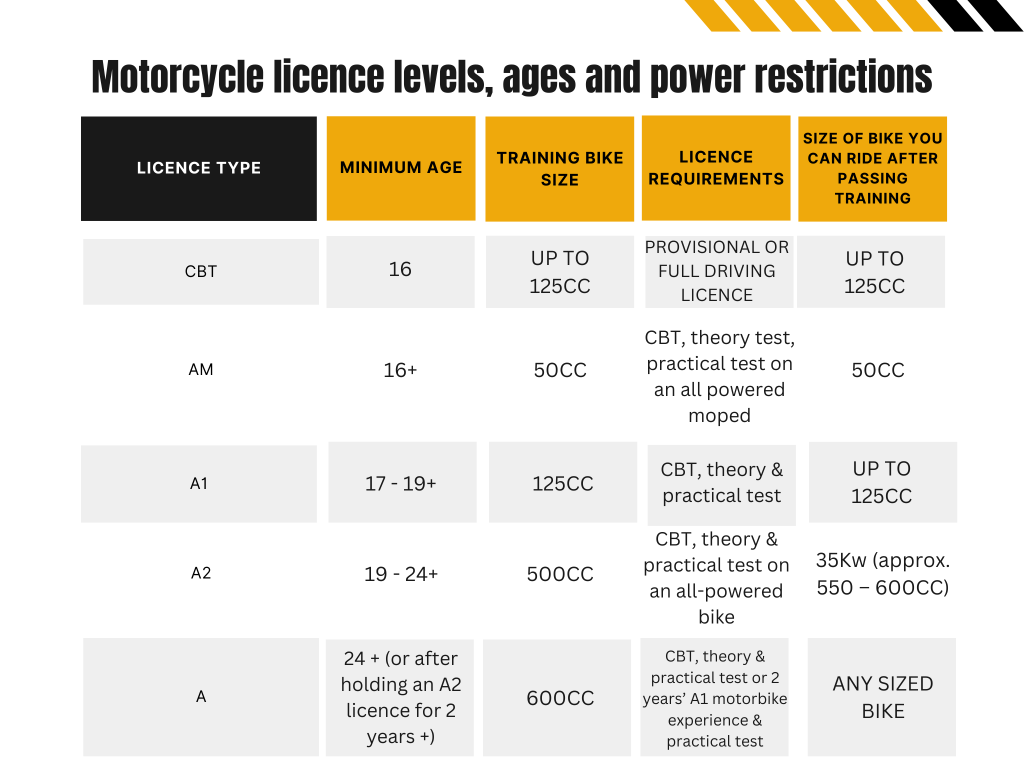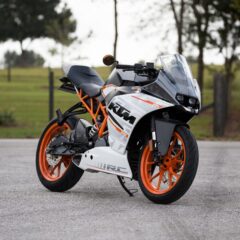
7 Top Motorcycle Accessories
With Christmas just around the corner, you might be wondering what to get your favourite motorcycle enthusiast or even a little something for yoursel...
 Phoenix Motorcycle Training LTD
Phoenix Motorcycle Training LTD
 Phoenix Motorcycle Training LTD
Phoenix Motorcycle Training LTD

Getting from A to B on a motorcycle is probably the most fun way to travel. The freedom and focus is great for your mental health too, so you’re likely to arrive at your destination with a smile. But before your ride off into the sunset, you’ll need some UK motorcycle classes to get your permit and licence.
Getting a motorcycle licence can be a little confusing. UK Motorcycle classes are a must for almost everyone who wants to use our roads with a moped or motorcycle. But it’s the ‘almosts’, ‘sometimes’, and ‘usuallys’ that make knowing which path to a full motorcycle licence is right for you.
This blog clarifies the different routes you can take to licensed riding, whether or not you need Compulsory Basic Training, and provides valuable tips for choosing the right motorcycle training school and instructor. When we get to the end, you’ll be ready to book the right UK motorcycle classes to answer your two wheeled dreams.
The tricky part of our motorcycle licensing system is that it’s tied to the age of the rider, the kind of motorcycle they want to ride, and how early you decide to begin your journey to motorcycle mastery. Because of these variables, choosing the right motorbike lessons for you can feel a little like playing pin the tail on the donkey.
Understanding the different licence categories will help you get started on the right foot. Licence levels are ranked according to the power of the motorcycle you’d like to ride.

Most riders will need to start their motorcycle licence journey with Compulsory Basic Training (CBT). The permit gained from this training lets you continue building your two wheeled skills on public roads before attempting to train and test for a full motorcycle licence.
Riders who don’t want to ride a motorcycle, scooter or moped more powerful than 50ccs and got their driver’s licence before February 1st, 2001 don’t need a CBT certificate to ride on UK roads. And if you’ve already got a motorcycle licence but want to move up a level, there’s no need to take a motorcycle training course in the UK to repeat your CBT.
For everyone else, the first step to getting your motorcycle licence is gaining a CBT certificate.

For most of us, the first motorcycle training course we take in the UK is the CBT course. There’s no pass or fail test with this training. Instead the course develops your motorcycling skills to a level of competency that allows you to capably continue practicing on public roads by yourself. The main aim of these UK motorcycle classes is to give you a strong foundation of rider safety and road awareness.
There are five elements to cover with CBT courses covering theory and practical riding knowledge. The practical elements are split between on-site riding (not public roads) and on-road riding. Your motorcycle instructor will work closely with you to make sure you’re comfortable and ready to go before taking you on the road for the final part of your training.
Once you complete your road ride safely and successfully, you’ll get a DL196 (CBT certificate). This is valid for two years and lets you ride with L plates for two years. You won’t be able to ride on motorways or carry a pillion passenger, but all other roads and rides are open for you to practice on and enjoy.
Remember highschool and sitting through long boring classes with teachers you don’t like droning on? You didn’t learn much, did you? It’s the same when it comes to choosing motorcycle classes. Look for a school and instructors who’ll adapt their teaching to your learning style. That’ll help you gain your licence faster and with more confidence.
We have some great tips for finding the best motorcycle training school for your goals and learning style, but the three steps below are a good place to start looking for UK motorcycle classes.
The motorcycle instructor you have is just as important, if not more, than the motorcycle training school you choose for learning to ride. Ideally, you’ll want a motorcycle instructor who is experienced, patient and able to adapt their teaching style to your learning style.
All of our motorcycle instructors hold Level 3 Awards in Education and Training. That shows they’ve learned how to teach, understand the various approaches to learning different students have, and know how to match their style to yours. It may seem like a little thing, but this knowledge means you’re much less likely to have your attention drift out the window when you’re learning about the Highway Code and other essential elements of motorcycle mastery.
Keeping you engaged and learning means making the training fun while still covering everything you need to master and giving you the support you need to keep practising and pushing yourself towards your goal. As your own educational experience will have shown you, not all teachers and instructors are able to do this. Look for a motorcycle training school and instructors who will ‘get you’ and support your motorcycle licence journey.
The equipment and facilities available for you to use will also impact how well your training goes and how quickly you reach your goal of learning to ride a motorcycle. Up-to-date, well maintained motorcycles will be easier to master than old, rickety motorbikes that are prone to stalling or breaking down.
On top of that, a training school that can cater to your creature comforts with tea and coffee making facilities and loos will keep you content and able to focus on the task at hand.
So make sure you check that the instructors and the site you’ll be training at can support your learning before you go ahead and book your motorcycle training sessions.
Everyone’s path to a motorcycle licence is unique. You may only need a few motorcycle classes, you may need more. What’s important is to figure out your destination (the licence type you want) and then find the right school and instructors to help you reach that goal. At the beginning, getting a motorcycle licence can feel like a tricky labyrinth to navigate. But with the right support and training, you’ll be revving into the fast lane of motorcycle mastery. Start your motorcycle journey and book your motorcycle classes with us today!

With Christmas just around the corner, you might be wondering what to get your favourite motorcycle enthusiast or even a little something for yoursel...

If you love motorcycle riding, you’ve probably daydreamed about riding a motorbike for a living. A professional racer or stunt rider is OK for some...

Getting a UK motorcycle licence can seem a complicated process. Particularly when compared to a driving licence for a car. Whether you choose the pro...
This website uses cookies to personalise content, ads, and analyse traffic, sharing data with partners who may combine it with other information. See our Privacy Policy for more information.